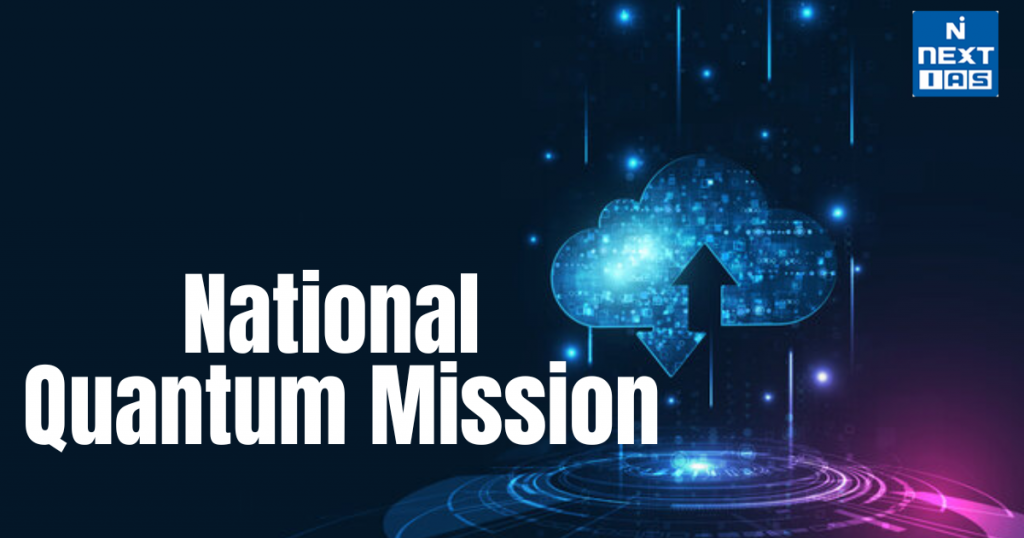
The National Quantum Mission is a visionary endeavor aimed at harnessing the immense potential of quantum science and technology to drive innovation and secure the future of the nation. Quantum technology, built upon the principles of quantum mechanics, offers revolutionary capabilities that promise to redefine computing, communication, cryptography, and sensing. Led by interdisciplinary teams of scientists, engineers, and policymakers, the mission seeks to accelerate the development and deployment of quantum technologies across various sectors, including healthcare, finance, defense, and beyond.
About The National Quantum Mission (NQM)
- The Union Cabinet, approved the National Quantum Mission (NQM) on 19th April 2023 at a total cost of Rs.6003.65 crore from 2023-24 to 2030-31, aiming to seed, nurture and scale up scientific and industrial R&D and create a vibrant & innovative ecosystem in Quantum Technology (QT).
- This will accelerate QT led economic growth, nurture the ecosystem in the country and make India one of the leading nations in the development of Quantum Technologies & Applications (QTA).
- The Mission objectives include developing intermediate-scale quantum computers with 50-1000 physical qubits in 8 years in various platforms like superconducting and photonic technology.
- Satellite-based secure quantum communications between ground stations over a range of 2000 kilometers within India, long-distance secure quantum communications with other countries, inter-city quantum key distribution over 2000 km as well as multi-node Quantum networks with quantum memories are also some of the deliverables of the Mission.
- The National Quantum Mission will focus on developing magnetometers with high sensitivity in atomic systems and Atomic Clocks for precision timing, communications, and navigation.
- It will also support the design and synthesis of quantum materials such as superconductors, novel semiconductor structures, and topological materials for the fabrication of quantum devices. Single photon sources/detectors, and entangled photon sources will also be developed for quantum communications, sensing, and metrological applications.
- Mission Implementation includes setting up of four Thematic Hubs (T-Hubs) in top academic and National R&D institutes in the domains:
- Quantum Computing
- Quantum Communication
- Quantum Sensing & Metrology
- Quantum Materials & Devices
- The hubs which will focus on generation of new knowledge through basic and applied research as well as promote R&D in areas that are mandated to them.
- NQM has the potential to elevate the country’s Technology Development ecosystem to a level of global competitiveness. The Mission would greatly benefit various sectors including communication, health, financial, energy with applications in drug design, space, banking, security etc. The Mission will also provide a huge boost to National priorities like Digital India, Make in India, Skill India and Stand-up India, Start-up India, Self-reliant India and Sustainable Development Goals (SDG).
Features of the National Quantum Mission (NQM)
- In five and eight years, respectively, it aims to construct intermediate-scale quantum computers with 50–100 physical qubits and 50–1000 physical qubits.
- Similar to how bits (1 and 0) are the fundamental building blocks used by computers to process data, “qubits,” also known as “quantum bits,” are the units of operation used by quantum computers.
- The expedition will contribute to the development of highly sensitive magnetometers for navigation, communications, and precise timing (atomic clocks).
- In order to fabricate quantum devices, it will also facilitate the design and synthesis of quantum materials, including superconductors, innovative semiconductor architectures, and topological materials.
- Additionally, satellite-based secure quantum communications between ground stations within India’s 2000 km range will be developed with the mission’s assistance.
- Secure quantum communications over long distances with other nations
- Distribution of inter-city quantum keys throughout 2000 km
- Multiple nodes Quantum memories in a quantum network
- Four Thematic Hubs (T-Hubs) on the areas of quantum technology would be established in prestigious academic and national research and development institutions:
- Computation at the quantum level
- Communication at the quantum level
- Quantum Metrology & Sensing
- Quantum Devices & Materials
Significance of the National Quantum Mission (NQM)
- In addition to making India one of the top countries in the development of Quantum Technologies & Applications (QTA) spanning from healthcare and diagnostics to defense, energy, and data security, this will accelerate QT-led economic growth.
- It will endeavor to develop quantum-based computers that are significantly more potent and capable of securely resolving the most challenging issues domestically.
Advantages of the National Quantum Mission (NQM)
- Enhanced Processing Capacity: Compared to modern computers, quantum computers operate far more quickly. They are also capable of resolving difficult issues that are currently out of our grasp.
- Enhanced Security: Quantum encryption techniques are far more secure than conventional encryption methods since they are based on the ideas of quantum physics.
- Faster Communication: With the possibility for totally unhackable communication, quantum communication networks are able to send information more quickly and securely than conventional networks.
- Improved AI: More effective and precise training of artificial intelligence models may be made possible by quantum machine learning methods.
- Improved Sensing and Measurement: Because quantum sensors are able to pick up on even the smallest environmental changes, they are helpful in fields including geological exploration, environmental monitoring, and medical diagnostics.
Lacunae of National Quantum Mission (NQM)
The National Quantum Mission (NQM) is a significant step toward advancing quantum technologies in India, but it faces several lacunae (gaps and challenges):
- Limited Skilled Workforce – India lacks sufficient experts in quantum computing, cryptography, and quantum communication, leading to talent shortages.
- Infrastructure Challenges – High-end quantum labs, fabrication facilities, and testing environments are still underdeveloped.
- Funding and Long-Term Investment – While the mission has allocated funding, sustained investment and private sector involvement are crucial for long-term success.
- Technology Dependence – Critical quantum components, such as superconducting chips and specialized quantum hardware, rely on foreign sources, affecting self-reliance.
- Industry Collaboration – Stronger partnerships between academia, startups, and industries are needed to translate research into real-world applications.
- Global Competition – Countries like the US, China, and the EU are advancing rapidly, making it essential for India to accelerate its efforts to remain competitive.
Key Points of the National Quantum Mission (NQM) for UPSC CSE Prelims
- Launch Year – Approved by the Indian government in 2023 to boost quantum technology research.
- Objective – Develop quantum computing, communication, sensing, and materials for national progress.
- Duration & Budget – ₹6,003 crores for eight years (2023–2031).
- Focus Areas – Quantum computing, quantum communication, quantum sensing/metrology, and quantum materials/devices.
- Implementation – Led by the Department of Science and Technology (DST).
- Quantum Computers – Develop 50-1000 qubit quantum computers across different platforms.
- Secure Communication – Establish a quantum communication network, including satellite-based systems.
- Innovation Hubs – Four Thematic Hubs (T-Hubs) will be created in top academic and research institutions.
- Global Competitiveness – Strengthen India’s position in the global quantum technology race.
- Strategic Applications – Enhances cybersecurity, defense, banking, and drug discovery.
Way Forward
The way forward for the National Quantum Mission (NQM) includes strengthening quantum research infrastructure, fostering industry-academia collaboration, developing indigenous quantum technologies, enhancing skilled workforce training, and promoting global partnerships. By advancing quantum computing, communication, and cryptography, NQM aims to position India as a global leader in quantum innovation.
Conclusion
The National Quantum Mission (NQM) drives India’s leadership in quantum technologies, fostering breakthroughs in computing, communication, and sensing. By promoting research, innovation, and self-reliance, NQM strengthens national security, industrial growth, and scientific progress, positioning India at the forefront of the global quantum revolution for a technologically advanced future.





